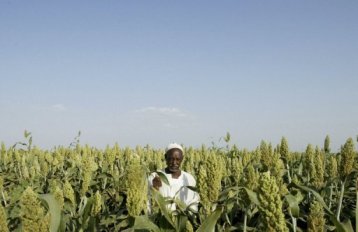Sudan seeks to boost wheat plantations to cut imports
September 9, 2013 (KHARTOUM) – The Sudanese government announced that it plans to grow 600,000 acres of wheat in order to cut the import tab for this crucial product used to make bread .

The deputy director of Sudan’s agricultural bank, Salah Hassan, said that wheat plantation project will kick off in the winter season adding that fertilizers and seeds have already been made available to farmers.
Hassan went on to say that a committee was formed to develop and submit an action plan to raise productivity and underscored the government’s keenness on increasing the domestic production of wheat.
The Finance minister Ali Mahmoud Abdel-Rasool said that any delay in producing wheat locally will burden the government which will be forced to import at a higher cost due to the global increase in its prices.
“We have to reduce imports through domestic production of wheat” Abdel-Rasool said.
Last May, Sudan’s minister of agriculture, Abdel Halim Al-Mutafi, who was testifying before the parliament, acknowledged that there is a serious shortage in agricultural finance, saying that last year’s allocated funds did not exceed 2.5 billion pounds (SDG) which represents only 2% of the total loans extended by the banks nationwide.
In the same testimony he questioned the possibility of achieving self-sufficiency and poverty alleviation, explaining that Sudan’s imports of food products exceed $1 billion, while spending on agricultural activities does not exceed a mere $600 million saying he expects a grain shortage of up to 76 thousand tonnes this year.
He noted that farmers prefer to grow crops which are more profitable than wheat, adding that price of a bag of beans is three times the price of a wheat bag.
Sudan’s agricultural sector has continued to deteriorate over the years mainly as a result of negligence, drought, mismanagement, high taxes and the overall economic climate.
Sudanese farmers often complain about the high costs of imported materials such as fertilizers. Many of them were sent to jail as their debt piled up.
Several ambitious plans enacted to bring life to the sector have failed to materialize and critics say the government forfeited a golden opportunity during the oil boom to beef up agriculture.
Foreign investors also complain about lack of infrastructure and unfriendly laws which they say deters them from putting money in Sudan’s vast farmlands.
(ST)
